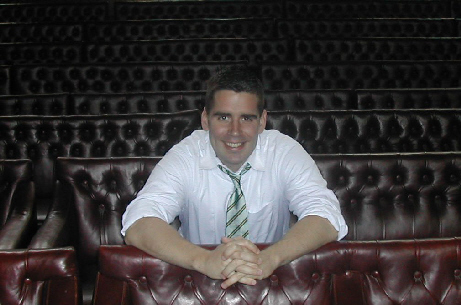
Former naval officer Jeremiah Schwarz is researching US policy in the former Yugoslavia.
Jeremiah Schwarz [2008] grew up with a strong sense of public service which has led him not only to a distinguished naval career, but research into the world of diplomatic decision-making in highly complex situations.
Born and raised in Queens, New York, his mother was a teacher and his father managed and designed homeless shelters and foster care facilities. “They believed in public service and their professions reflected this,” he says. “Their example instilled in me the importance of using one’s talents in a selfless way to help others.”
As a teenager, Jeremiah read The Greatest Generation, a book about World War Two veterans and their contributions after the war. It had a big impact on him. “It told of how a generation of veterans had taken their sense of selflessness and service through from the war and how they applied this to other areas of their lives, such as working in the private sector, academia, or the public sector,” he says.
He was also strongly influenced by his neighbour, a World War Two veteran, who was part of the first landing at Normandy, and whose wife was a Holocaust survivor.“Their example as human beings reinforced my desire to serve my country and use my skills in the service of others,” he says.
After high school, he joined the Navy as a midshipman and won a Navy ROTC scholarship to study at Fordham University, a leading national Jesuit university which also emphasised the public service ethos as part of its curriculum.
In 2003 he was commissioned as a naval officer, two months after the invasion of Iraq. By autumn 2004 he was deployed to the Persian Gulf and took part in maritime security operations as a small boat officer serving the al-Basra oil terminal, not far from where British sailors were abducted a year later.
By 2005, he was deployed in the Horn of Africa on anti-piracy operations and tsunami relief work. He was later awarded the Navy and Marine Corps Commendation Medal for outstanding service and innovative leadership resulting in significant and crucial improvements in unit performance during wartime along with other awards such as the Global War on Terrorism Expeditionary Medal (for his work in Iraq and the Horn of Africa), the Global War on Terrorism Service Medal and the National Defence Service Medal.
In September 2007, after four and a half years of active service he was discharged and arrived in Cambridge the next day to begin his MPhil in Development Studies on a Truman Scholarship. He was keen to continue his studies and was encouraged to apply by his supervisor.
His masters’ research covered economic development strategies and how public policy influences economic development. He was also interested in ethnic conflict and how political systems can reduce or resolve ethnic conflict. He studied models of federal systems where ethnic conflicts had been resolved or significantly reduced. After completing his MPhil, he was awarded a Henry Luce Scholarship and spent the year in Singapore as a Visiting Fellow at the Lee Kuan Yew School of Public Policy and worked as an economic development consultant in Southeast Asia.
His research in Singapore resulted in him writing a chapter “ASEAN’s Merdeka Moment” in Facets of Competitiveness: Narratives from ASEAN. It examines the alternative historical models for economic integration among ASEAN countries. Jeremiah argues that ASEAN countries should pursue alternative economic models from that of the European Union; with a focus on creating sub-regional economic agreements and regional networks of cooperation relating to specific challenges, such as the environment and maritime security.
Jeremiah returned to Cambridge in 2009 for his PhD in the History of International Relations and chose to study a federal system that had not successfully resolved ethnic and sectarian conflict – Yugoslavia. In particular, he is examining the role of US defence policy in the Bosnian War. “The real issue I am looking at is how diplomatic and military tensions shaped political strategies,” he says.
He has interviewed a cross-section of officials from the Clinton administration and those from both Bush administrations. “I am interested in understanding how one makes responsible decisions as a public servant in an incredibly tense, complex, and dynamic environment,” says Jeremiah. “I believe this work will demolish a lot of myths that have grown up about the decision-making process of US policymakers in the Bosnian war. False histories and serious misperceptions have arisen due to limited reporting and mis-contextualisation. These assertions have been repeated and recycled and then accepted as unvarnished truth.” He lists myths such as the “Vietnam Syndrome myth”, “the myth about clean intervention” and the myth about how and when external countries intervene.
In 2010, he was elected Vice President of Cambridge Union Society where he became only the second American to hold the post and the longest serving Vice President in the nearly 200-year history of the world’s oldest debating society. In 2011, in addition to serving as a visiting professor at the Zagreb School of Economics and Development over the summer, he founded PLIIX LLC, a global strategic advisory firm specialising in public policy strategy, economic development, international security, and innovative policies in the Asia-Pacific region.
Jeremiah plans to return to the US on completion of his studies, but is not sure what the future holds for him. “I may write a book based on my research or use it as the basis for post-doctoral study or for policy-related work,” he says. “What I do know is that my future lies in public service.”












